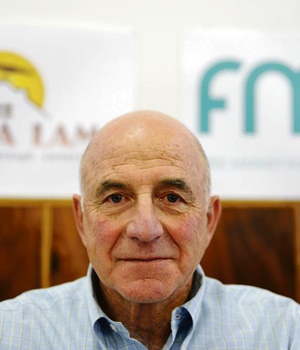
The Free State township of Tumahole is becoming a laboratory for what is being punted as an alternative to redistributive land reform – and it uses a neglected piece of late-apartheid land.
Libertarian think-tank the Free Market Foundation (FMF) this week passed on a third tranche of title deeds as part of its Khaya Lam land reform project.
It aims to convert municipal leasehold properties in townships into fully tradable private properties by using private donations.
The project was started in 2008 by FMF director and Parys resident Perry Feldman.
Tumahole is near the town of Parys in the Ngwathe Local Municipality.
The pilot project was launched in 2012 and the first deeds were handed over in 2013.
At the time, the FMF made bold statements about titling all erven in the municipality, which it estimates to be at 17 000, within a few years.
About 700 have been done or nearly done, and the mechanics of the process are still being ironed out.
“People didn’t trust us, but it’s a reality,” says Feldman, dismissing concerns about the initial slow progress.
The FMF has set up an office at Tumahole’s municipal offices where Jeanette Mpondo, the FMF’s land reform liaison officer, receives applications, collects the necessary documents and prepares the applications for lodging.
After that, it is mostly a question of funding the applications, says Feldman.
Following initial sponsorships for 200 transfers each from FNB and retail mogul Christo Wiese, the FMF hopes to appeal to more wealthy benefactors and corporations, while local commercial farmers have also started sponsoring transfers.
It requires R1 850 per property, which covers about R1 000 for the conveyancing services of the small Parys law firms getting the work, as well as the administration costs.
According to Jan du Toit, one of the lawyers conducting the conveyancing for Khaya Lam, it is still “quite a lot of work” for a modest profit on each transfer.
The project only applies to people who are the registered occupiers of a municipal property in a formally surveyed township. They must also be indigent.
“We have to go into self-funding,” says Feldman.
This means employed residents must put up the R1 850 themselves to get their titles.
The project presses several political buttons.
For the FMF, it represents a model for land reform without redistribution from private white hands, or the attendant costs.
Instead, it could see municipal land – and ultimately traditional communal land – in South Africa converted into private property.
FMF director Eustace Davie jokes that they will “get to traditional land” after they complete the conversion of the unknown millions of municipal leaseholds in South Africa.
For the Parys farming community, it is a way to mend their historically fraught relationship with the people living on and around their farms, Feldman points out.
Khaya Lam is inspired by Peruvian economist Hernando de Soto’s influential and controversial “dead capital” theory.
This revolves around the economic potential of informal housing in South America, including Peru.
He led projects similar to FMF’s Khaya Lam initiative to give title deeds to dwellers in informal settlements.
The idea was that an explosion of economic activity would ensue once these properties entered the financial system as collateral for loans.
However, the evidence for these projects having a major effect of that nature has remained slim, but its proponents have found various other virtues in the approach.
According to Mpondo, the most common reason people come to her is not to transact with their properties, but to ensure their children’s inheritances.
Some can leverage their houses for student loans, home improvements or business funding, she told City Press.
The approximately 17 000 erven in Tumahole that could be transferred amount to “R2 billion” in dead capital, according to a recent article by Davie.
This assumes an average property value of about R120 000 being realised through a sale or debt.
According to Du Toit, a vacant Tumahole plot sells for about R4 000, but the developed part of the township has a varied property market with minimal RDP-type houses situated near large and elaborate ones.
Records at the Bloemfontein Deeds Office indicate that properties in Tumahole have been selling for up to R420 000 for 311m2 since 2013, but mostly under R100 000 for properties between 240m2 and 530m2.
A property that was seemingly transferred in the first tranche of Khaya Lam titles is currently on sale at a value of R25 000.
What does titling entail?Townships such as Tumahole were created, legally speaking, by the Black Communities Development Act of 1984 and its amendments in the final crisis-ridden days of apartheid.
The act marked the point where the white government belatedly accepted that black South Africans would, and in fact already did, permanently reside in South Africa, as opposed to the homelands or in transitory workers’ hostels.
It created the 99-year lease system and, in 1991, the Upgrading of Land Tenure Rights Act created the simplified process for converting these into full title.
The FMF is picking up this transitionary arrangement that was overtaken by the larger land restitution and RDP programmes after 1994.




 Publications
Publications
 Partners
Partners








